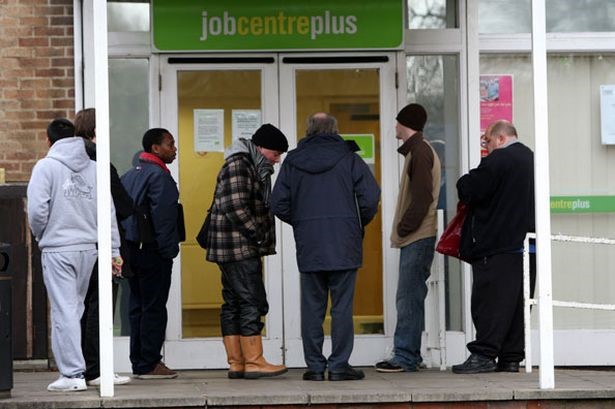This article, although about the UK is relevant for most nations in the EU.
Danisha Kazi is Senior Economist at Positive Money UK
Cross-posted from Positive Money

A tsunami-like wave of job cuts is expected once the government’s Coronavirus Job Retention Scheme (CJRS) comes to an end in October. The furlough scheme was set up to protect jobs during the crisis by covering 80% wages up to £2500 and now covers 9 million workers. The CJRS closes to new entrants tomorrow and will gradually wind down as employers have to contribute more to wages from August. While millions more may still have their job, they’ve suffered vastly reduced working hours. Official unemployment figures have yet to catch up with the grim reality of the UK jobs market, so much of what we know is pieced together from various sources – but these still paint a very troubling picture.
Almost 3 million more people have signed on for unemployment benefits since lockdown began, a rise of 126% from pre-pandemic levels. Job vacancies between March and May dropped from 800,000 to 320,000, the largest quarterly drop in job vacancies since record, and the Bank of England has predicted UK unemployment could climb to 9% by 2020 Q2. Finally, another alarm bell on the jobs front is that despite receiving generous government bailouts to the tune of £1.8 billion through the Covid Corporate Financing Facility (CCFF), many large corporations such as British Airways and EasyJet have continued to announce sweeping job cuts.
These warning signs have led to gloomy comparisons with the 1980s, when unemployment peaked at 12% in 1984 with over 3 million out of work. However, even more concerning than the figures themselves, is the government’s failure to recognise the misguided policies which created the UK’s precarious labour market in the first place; characterised by low wages, underemployment and zero hour contracts. In February the Office for National Statistics published figures showing the number of people on zero hour contracts has risen five fold in the past decade alone, from 190,000 workers in 2011 to 974,000 workers by 2019.
This crisis has accelerated the need to address our dysfunctional labour market. Rooted in Thatcherite neoliberal policies of the 1980s, which replaced the government’s policy commitment to full employment with a narrow focus on tackling inflation at any cost, and resulted in recession and high unemployment. Throughout that decade, the government implemented anti-union legislation and deregulated labour markets to make firing and hiring easier, and allow greater flexibility in employment contracts and hours worked. High interest rates used to curb inflation (combined with high value of the pound) eroded away British manufacturing and created structural unemployment in many parts of the UK. Deindustrialisation and privatisation of key sectors also chipped away at the necessary role of unions in protecting workers rights and wages. The effects of these policy shifts are still felt today, with over half the people in poverty in 2018 living in a household with at least one person working.
After the 2008 financial crisis, the willingness to accept any wage or any job was seen as a triumph of the virtues of flexible labour markets. By 2019, the government boasted of record employment at 76%, and the lowest unemployment rates since the 1970s. But the dark underbelly of record employment has been revealed in dramatic shifts in the pattern of employment towards ‘atypical’ contracts: self-employment (15%), part-time (26%), temporary (5%) and agency and zero hour contracts (5.5%). The problem with employment in the twenty-first century is not a lack of jobs – but the quality and low-pay which defines them.
While a tight labour market should in theory lead to higher wages, this abstract relationship has long broken down, evidenced by the stagnation in real wages since 2008. In fact, this has been a long-term trend as real wage growth, that is nominal wages adjusted for inflation, has weakened every decade since the 1980s. Real wage growth which averaged 2.9% in the 1970s and 1980s, had declined to 1.5% by the 1990s, and dropped even further to 1.2% in the 2000s. The Bank of England accredited poor wage growth to structural changes, including greater labour market flexibility and insecure employment.
Consecutive governments have neglected the role of quality employment in building a fairer economy for far too long, but leaving it solely to market forces will only worsen an already grim scenario. Without a plan to address the structural problems of our labour market, existing inequalities will continue to widen. The government should intervene now to provide the necessary stimulus to avoid a jobs catastrophe.
The good news is that we can rebalance the employment landscape in favour of workers and create jobs that lift people out of poverty. Policies that are fit for the 21st century such as a green jobs guarantee, shorter-working week and Universal Basic Income (UBI) should all be on the table if the government wants to make good on its promises to level up the economy and drive a green recovery. We also need worker-centred approaches, such as giving a voice to workers on company boards, or democratising ownership by embracing alternative cooperative business models. In choosing how we respond to the impending unemployment crisis, we must consider a future of employment that benefits everyone. These changes would lead to fairer decisions regarding executive pay, reducing the power of shareholders, greater investment in workers skills and bringing an end to bad employment practices, such as zero hour contracts.
So far large-scale government intervention to limit the worst impacts of this crisis has been embraced. It’s time to take that one step further and fundamentally reshape our labour market to foster the kind of jobs and industries that will help build back a fairer and greener economy that works for us all.



Be the first to comment